The Light from the TV Shows: A Chat with Lennie James (“Low Winter Sun”)
Lennie James is a familiar face to fans of cult and comic-book-inspired TV series, having been a regular in “Jericho” and guesting on “Human Target” and “The Walking Dead,” but now he’s trying his hand at an American cop drama, starring in AMC’s “Low Winter Sun.” James’s career has also featured several notable film roles as well, and he was kind enough to chat about a few of those, too, most notably reflecting on the passing of his “Snatch” co-star Dennis Farina. First, though, we dove into discussion about how he came by his current gig, the difference between how his character’s written and how he plays the part, and his fondness for AMC’s way with surprises.
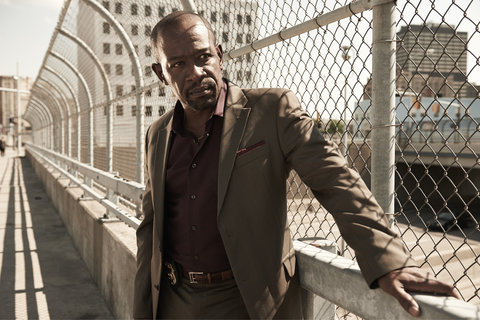
Bullz-Eye: So were you actively looking for a series gig, or did “Low Winter Sun” just kind of fall into your lap?
Lennie James: Um…I’m trying to remember how it went around! I think it was… I’d gone home to Britain to do a television series over there, and then when I got back, “Low Winter Sun” was… [Hesitates.] Oh, that’s actually what happened. I was just about to lie to you. I’ll tell you the truth now.
BE: The truth is always preferable when I can get it.
LJ: Yeah! Well, I shot a pilot that didn’t go, and the script for “Low Winter Sun” kind of came in, and…it was very conventional: I read it, I liked it, and then went and met on it, and it happened.
BE: What was your familiarity with the original British version?
LJ: I didn’t have a familiarity with it.
BE: Oh, really?
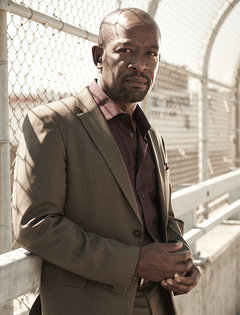
LJ: No, I was already out in the States when it went on in Britain, so I actually had no knowledge of it whatsoever. So I learned that it was an adaptation of a British version only after I was doing it and never watched the original until after we’d shot the pilot. In fact, when we were shooting the pilot, Mark (Strong) had it on his computer. He said, “Look, you can watch it if you want to watch it.” And I said that I didn’t want to, y’know, partly ‘cause I didn’t think it would help me in any way, shape, or form, because we were about to be given the chance to do something completely different, but also the actor who played my part in the original, I had just finished working with (him), and I kind of didn’t want his voice in my head while I was attacking the character.
BE: Even if I hadn’t known it was a British series, the pilot still very much felt influenced by British TV sensibilities. It feels a bit darker than the typical American police drama.
LJ: I was having this conversation earlier, that there’s a profound difference between British cop shows and American cop shows, and I think at their heart it’s to do with the gun. It’s to do with the fact that, if a British police officer is chasing a criminal down the road…it’s slightly changed in modern days, but historically, if he catches him, the story kind of goes on from there. If he doesn’t catch him, the guy gets away. In a lot of American cop shows, if he can’t catch him, he’ll shoot him. And that gives you kind of a profound difference at the heart of your storytelling. And although our story starts with an act of violence, and somebody now does get shot in the beginning, the police officers very rarely pull their guns out. In fact, I think the first time that a police officer pulls their gun out in “Low Winter Sun,” it’s Frank pulling his gun out on me. And I think that says something very much about the nature of this particular cop show and how much we’re…trying… [Hesitates.] I don’t want to overstate it, but we’re trying to do something different with the genre.
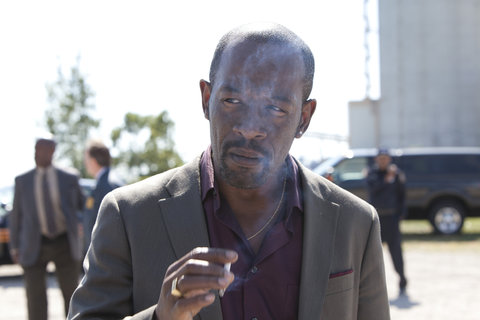
BE: In the press release, Geddes is described as “part cop, part perp.” It makes for a good one-liner, obviously, but is it a decent assessment of the character?
LJ: It’s a good place to start. It’s a good place to introduce people to who he might be. It’s not my description of the character, but it’s also… Sometimes I feel, and to say this kind of is overstating it and being a bit jokey, but I have a slight journey with the writer’s room. They’re writing my character as kind of an out and out baddie, and I’m writing him as a misunderstood geezer. [Laughs.] And I’m playing him as a misunderstood fella. And the two of those things together are in broad terms, I think, where Joe Geddes lives, in the sense that he’s a man who seems quick and accepting of doing things that could be perceived to be on the wrong side of the line. That doesn’t, as far as I’m concerned, mean that he doesn’t feel the consequences of them. It doesn’t mean for me that he doesn’t suffer the choices, and it doesn’t mean that he doesn’t have pangs of conscience about it. But it also doesn’t mean that it stops him from doing it.
BE: Well, you know, when it comes to AMC, nothing is obvious and everyone is an enigma.
LJ: [Laughs.] Yes. And he very much falls into that camp.
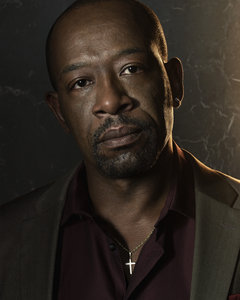
BE: You’ve done police dramas in the UK. Is doing one here in the States everything you’d hoped it would be?
LJ: Yeah, I’m loving doing this job. I’m enjoying the character, I’m enjoying the cast and crew… I mean, I’m having more fun on this job than I thought I was going to. And I always try to have fun. Otherwise there’s very little point in doing what I do.
BE: You’ve got a bit of a history with AMC, having played a small part in “The Walking Dead.” Do you know if they’d been actively trying to find this full-time gig for you, or did it just play out that way?
LJ: I don’t know. That’s a question you’d have to ask them. They seem to like me over there, I suppose. [Laughs.] They’ve shown an interest in me. And I’m very fortunate for a network to do it. It’s a place and a group of people I enjoy working with. I like their ethos. I like what they’re trying to do in TV, particularly for…I mean, it’s basic cable, y’know? They’re limited. They don’t have the benefit of tits and ass and profanity that some of the other premium cable networks have, that allow them to come up with the stuff that they come up with, and they’ve had to be more creative about it. But then when you look at the stories that they’re telling…y’know, they’re doing a smart job over there. I like working for smart people. I like working for people who might surprise me. And AMC surprises…well, not just me! If you think about their three biggest shows, all of those shows are surprises. Nobody would have, in any way, shape, or form, predicted the success of “Mad Men,” “Breaking Bad,” or “The Walking Dead.” And anybody who says they did is a liar.
BE: I wanted to ask you about a few other things from your back catalog. As an avowed music geek, I’m very partial to “24 Hour Party People.”
LJ: Good! It was a lot of fun, that film. It was also very, very frightening.
BE: How so?
LJ: Because it was a 24 hour party. [Laughs.] For real!
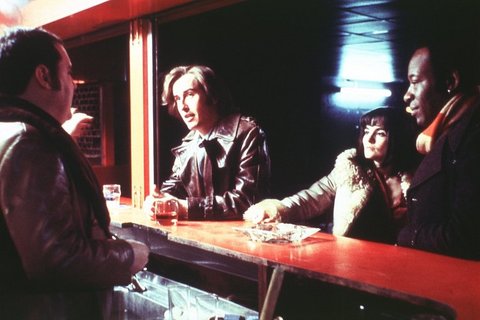
BE: What was your familiarity with the Manchester music scene going into the film?
LJ: I was aware of it. I wasn’t really massively into it. I’d never been to the Hacienda, never even thought about the Hacienda as a big place to go. To a greater or lesser extent, at the time I thought about a lot of the music they were making, but the scene up there…I wasn’t really into E, into Ecstacy, and all of that. It was just an excuse to… [Starts to laugh.] No offense, but to make white boys look like they could dance.
BE: None taken. I freely admit that I can’t dance.
LJ: [Laughs.] Well, there you go. So, anyway, I wasn’t really into all of that, so it was a learning curve for me when I was doing that film, but I learned a lot, and I came out with a bigger appreciation for that scene and for what was going on in Manchester and for the bands that came out of there than I had going in.
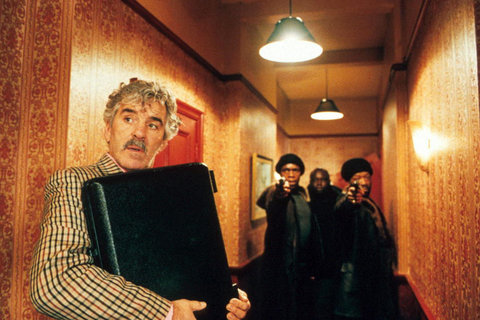
BE: Given Dennis Farina’s recent passing, I’ve been thinking about “Snatch” a fair amount lately. How were your experiences working on that film?
LJ: It was another one that was kind of crazy. It had a slightly crazy beginning. It was, y’know, one of those where Guy (Ritchie) and the crew were off of a huge success with “Lock, Stock & Two Smoking Barrels,” and after “Lock, Stock,” Guy literally got everyone phoning him up, saying, “Whatever you do next, I’d like to be in it.” So the original cast list for “Snatch” was just insane. Arnold Schwarzenegger was supposed to be Rade (Serbedzija’s) character, Boris the Blade, and Dustin Hoffman and Robert DeNiro and loads of people were all supposed to be in it and all set in place. And in the end, I think it whittled down to where the cast that ended up doing it couldn’t have been bettered. But, yeah, it’s sad, the passing of Dennis. A very good friend of mine, Richie Coster, was in “Luck” with Dennis, so we kind of passed our blessings and hellos to each other through my buddy. He was a lovely guy to be around. He was kind of…real. He had a whole life before he had this life. He wasn’t defined by the job of acting, and he was a much more interesting geezer because of that. And I liked him. So it’s sad to see him go.
BE: My first TCA tour took place as the second season of “Jericho” was about to kick off. Given the last-minute salvation of the series the first time, were you still surprised that it didn’t go on to a third season, or were you just happy that you managed to get as much as you got?
LJ: That whole experience of “Jericho”… I wasn’t of the benefit of knowing anything different. I didn’t know that that’s just not the way that everything happens over here. D’you know what I mean? It was all a new experience for me. It was the first time I’d ever played a single character for 22 episodes, and then going forward to do it for 29. After the first 22 and the show was cancelled, I was, like, “Oh, okay,” because, y’know, at that time, to do 22 episodes of anything would take me three years in England. Because we do six-episode things. So it would’ve taken me a huge amount of time, and it would’ve been great. So doing 22 of them, I was, like, “Okay, if it’s over, it’s over.” So I wasn’t looking on the internet, I wasn’t doing any of that.
It was Michael Gaston, who played Mayor Anderson in it, who phoned me up when I was England, and he said, “Have you seen this stuff that’s going on on the internet?” And I went, “No,” and he said, “Have a look, dude!” [Laughs.] So I went and had a look, and I was, like, “Wow, that’s cool!” So I wasn’t aware of the history-making of it, of the actions that our fans took. None of that kind of had a reverberation until much later down the road, when I was, like, “Wow. Wow. They really went for it. They really wanted that show back.”
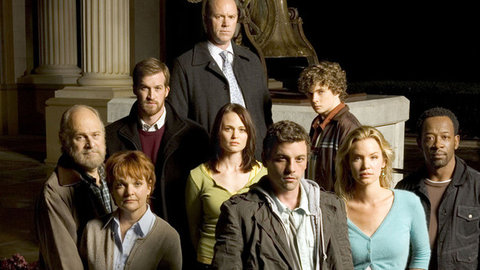
So, listen, a third season would’ve been great. At that particular moment in time, it was slightly kind of devastating, because after the first season I’d moved my family to America, and then the show was canceled, and then it was brought back, so it was a tricky time. But in the end, touch wood, it kind of worked out. And I’ve got a lot of loyalty to the people involved in and on “Jericho,” because they’ve shown a lot of loyalty to me, and I made some friends for life on that job. And that doesn’t happen all the time, because the life we live is kind of that of a nomad. You just travel around. And when you join with the circus, that is your world, and then when it’s finished, you go off in a different direction. But with “Jericho”…well, you know, Sprague (Grayden) is on this, and she was on “Jericho.” Yeah, I made friends for life, and for me, that’s about as high a testament as you can get from a working relationship.
BE: I know we need to start wrapping up, but do you have a favorite project that you’ve worked on over the years that didn’t get the love you thought it deserved?
LJ: Yeah. I did a thing back in England called “Buried,” which is something I’m deeply, deeply proud of. A bit like the journey of “Jericho,” the network screwed it up. They put it out at the wrong time, and they didn’t invest their time, energy, or interest in it that they should’ve done. The only kind of plus that I can say about it is that the network cancelled it, and two weeks later it won a BAFTA.
BE: And I just have to close by mentioning that I was a big fan of Baptista, your character on “Human Target.”
LJ: Yeah!
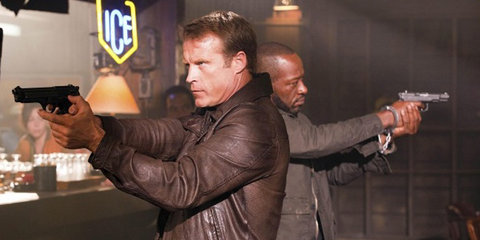
BE: Did you enjoy doing those episodes? The first season of that show in particular was really fun and action-packed.
LJ: Yeah, it was lovely. And, again, it’s what I’m talking about with the loyalty that the guys from “Jericho” showed me. It was created by Jon Steinberg, who created “Jericho,” and the character of Baptiste he created for me. They went, “We want you around,” and I was very, very grateful and am forever in their debt that they did this lovely thing. They created a really sweet part for me. ‘Cause, y’know, he was the nemesis of the main guy. He was the main guy’s equal, and that’s very rare in those kinds of things when that’s what’s on offer. I was his kind of Moriarty, as it were, and what it meant was that whenever I was on the show, it was an event. I wasn’t just there to shift a bit of story around. When Baptiste was there, it was a big, big deal. And I think that meant that the writer’s room liked writing for him. And it was fun to go up to Vancouver and shoot it, to do these incredible fight scenes and be an assassin and, y’know, you’re running around like you’re a kid, going, “Can we do this? Let’s do this! Let’s jump off of a 50-foot wall and then do a spin and get up and shoot somebody in the neck!” [Laughs.] It was lovely.
BE: Does that kind of sum up acting for you, the idea of being a big kid and getting to play “Let’s Pretend” for a living?
LJ: Yeah! I mean, the fact of the matter is that I’ve pretty much made my name on being taken very seriously, and I enjoy that, but I equally enjoy…y’know, people talk a lot about the heartbreaking moments for Morgan in “The Walking Dead,” but for every one of those, I enjoy the stupidness of “Snatch” or the rolling-around in “Human Target.” I’ve equally enjoyed those moments and tried to invest in the silliness as much in the seriousness.
Related Posts
Comments Off on The Light from the TV Shows: A Chat with Lennie James (“Low Winter Sun”)
Posted in: Entertainment, Interviews, Movies, News, Television
Tags: AMC, Arnold Schwarzenegger, Buried, Dennis Farina, Dustin Hoffman, Guy Ritchie, Human Target, Jericho, Jonathan Steinberg, Lennie James, Lock Stock & Two Smoking Barrels, Low Winter Sun, Luck, Mark Strong, Michael Gaston, Rade Serbedzija, Richie Coster, Robert DeNiro, Snatch, Sprague Grayden, The Light from the TV Shows, The Walking Dead, Will Harris








